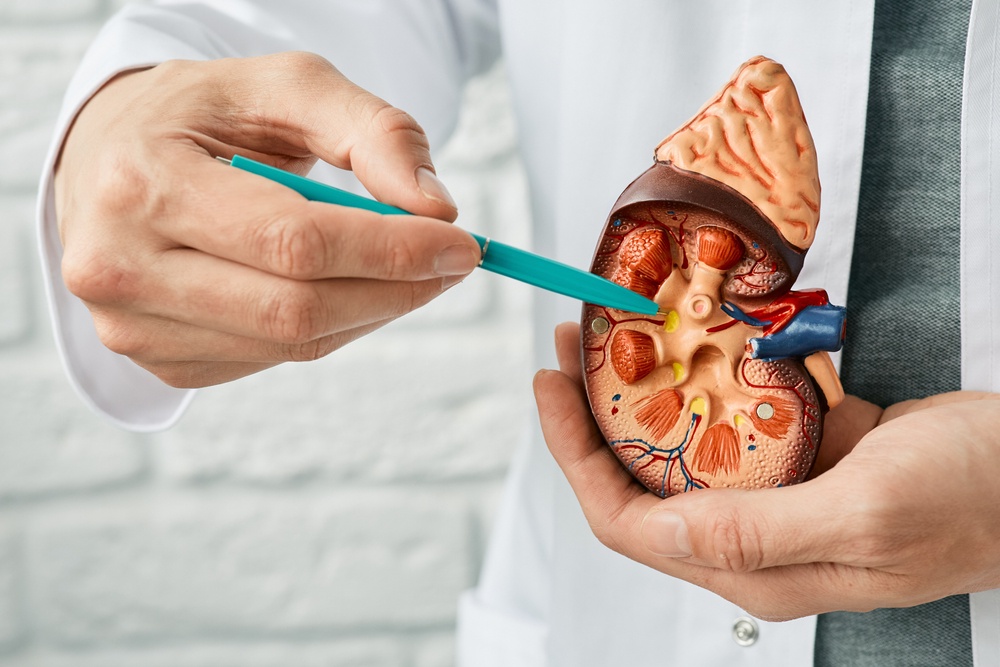In this article, we will delve into the definition of the Kidney, its functions and study the different types of kidney cancers, such as Renal cell carcinoma (RCC), Transitional cell carcinoma (TCC), Wilms’ tumor, and Renal Sarcoma.
What is the Kidney?
The kidneys are two bean-shaped organs located on either side of the spine in the lower back. They are a vital part of the urinary system and are responsible for filtering and removing waste and excess fluid from the body. The kidneys also help regulate the body’s electrolyte balance, blood pressure, and production of red blood cells. The waste and excess fluid that is filtered out of the blood by the kidneys is then eliminated from the body in the form of urine. Kidneys are essential organs for maintaining overall health and well-being.
Functions of the Kidney:
Filtration of Blood:
The kidney’s primary functionis to filter waste and excess substances from the bloodstream. It does so by processing approximately 200 quarts of blood daily, removing unwanted waste and water to produce urine.
Regulation of Blood Pressure:
The kidney plays a pivotal role in regulating blood pressure by managing the volume of blood and the concentration of sodium and other electrolytes. It also produces renin, a hormone that controls blood pressure.
Electrolyte Balance:
The kidney maintains the balance of essential electrolytes like sodium, potassium, and calcium in the body. This balance is crucial for various bodily functions, including nerve signaling and muscle contractions.
Acid-Base Balance:
Kidneys help regulate the body’s pH levels by excreting hydrogen ions and reabsorbing bicarbonate ions. This process is critical for maintaining proper acid-base balance.
Red Blood Cell Production:
The kidneys produce erythropoietin, a hormone that stimulates the bone marrow to create red blood cells. This is essential for preventing anemia.
Types of the Kidney Cancer:
Renal Cell Carcinoma (RCC):
Renal cell carcinoma is the most common form of kidney cancer, accounting for around 90% of all cases. It typically originates in the lining of the small tubes in the kidney and can be challenging to diagnose in the early stages. Symptoms may include blood in the urine, pain in the back or side, and a lump in the abdomen. Treatment options may include surgery, targeted therapy, immunotherapy, or radiation therapy.
Transitional Cell Carcinoma (TCC):
TCC primarily affects the renal pelvis, which is the area where the kidney connects to the ureter. This type of kidney cancer is less common than RCC but is known for its aggressive nature. Symptoms include blood in the urine, back pain, and frequent urination. Treatment may involve surgery, chemotherapy, or immunotherapy.
Wilms’ Tumor:
Wilms’ tumor is a rare form of kidney cancer primarily affectingchildren. It usually manifests in children aged 3 to 4 years. Common symptoms include abdominal swelling, fever, and blood in the urine. Treatment often involves surgery to remove the tumor and, in some cases, chemotherapy.
Renal Sarcoma:
Renal sarcoma is a rare and aggressive form of kidney cancer that originates in the connective tissues of the kidney. This type of cancer is often diagnosed in later stages due to its tendency to grow without causing noticeable symptoms. Treatment options may include surgery, chemotherapy, and radiation therapy.
Conclusion:
The kidney is an indispensable organ responsible for a range of essential functions in the human body, from waste filtration to blood pressure regulation. Understanding these functions is crucial for maintaining overall health. Additionally, kidney cancer, though relatively rare, comes in various forms, each with its own unique characteristics and treatment approaches. Early detection and prompt medical intervention are critical in managing kidney cancer effectively. It is important to stay informed about kidney health and seek medical attention if any concerning symptoms arise, as early diagnosis and treatment can significantly improve the prognosis for kidney cancer patients.


No comments yet